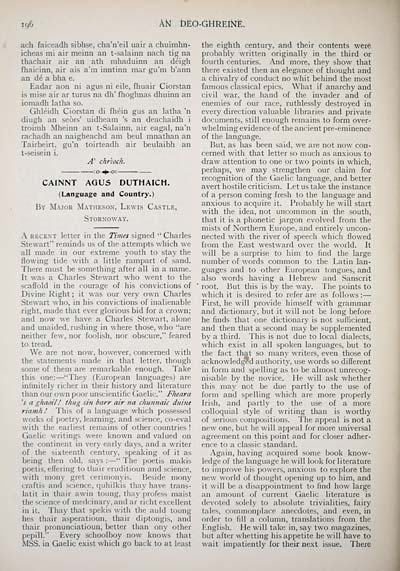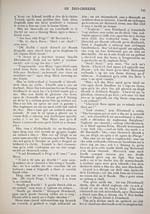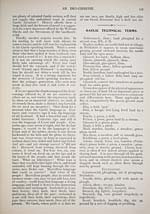Blair Collection > Deo-gréine
(218)
Download files
Complete book:
Individual page:
Thumbnail gallery: Grid view | List view

igè
AM DEO-GHREINE.
ach faiceadh sibhse, clia'n'eil uair a chuimhn-
icheas mi air meinn an t-salainn nach tig na
thachair air an ath mhaduinn an deigh
fhaicinn, air ais a'm inntinn mar gu'm b'ann
an dè a bha e.
Eadar aon ni agus ni eile, fhuair Ciorstan
is mise air ar turus na dh' fhoghnas dhuinn an
iomadh latha so.
Ghlèidh Ciorstan di fhèin gus an latha 'n
diugh an seòrs' uidheam 's an deachaidh i
troimh Mheinn an t-Salainn, air eagal, na'n
rachadh an naigheachd am beul mnathan an
Tairbeirt, gu'n toirteadh air beulaibh an
t-seisein i.
A' chrìoch.
CAINNT AGUS DUTHAICH.
(Language and Country.)
By Major Matheson, Lewis Castle,
Storkoway.
A recext letter in the Times signed " Charles
Stewart" reminds us of the attempts which we
all made in our extreme youth to stay the
flowing tide with a little rampart of sand.
There must be something after all in a name.
It was a Charles Stewart who went to the
scaffold in the courage of his convictions of
Divine Right ; it was our very own Charles
Stewart who, in his convictions of inalienable
right, made that ever glorious bid for a crown;
and now we have a Charles Stewart, alone
and unaided, rushing in where those, who "are
neither few, nor foolish, nor obscure," feared
to tread.
We are not now, however, concerned with
the statements made in that letter, though
some of them are remarkable enough. Take
this one: — "They (European languages) are
infinitely richer in their history and literature
than our own poor unscientific Gaelic." Fheara
's a ghaoil! thug sin barr air na chunnaic duine
riamh! This of a language which possessed
works of poetry, learning, and science, co-eval
with the earliest remains of other countries !
Gaelic writings were known and valued on
the continent in very early days, and a writer
of the sixteenth century, speaking of it as
being then old, says: — "The poetis makis
poetis, effering to thair eruditioun and science,
with mony gret cerimonyis. Beside mony
craftis and science, quhilkis thay have trans-
late in thair awin toung, thay profess maist
the science of medcinary, and ar richt excellent
in it. Thay that spekis with the auld toung
hes thair asperatioun, thair diptongis, and
thair pronunciatioun, better than ony other
pepill." Every schoolboy now knows that
MSS. in Gaelic exist which go back to at least
the eighth century, and their contents were
probably written originally in the third or
fourth centuries. And more, they show that
there existed then an elegance of thought and
a chivalry of conduct no whit behind the most
famous classical epics. What if anarchy and
civil war, the hand of the invader and of
enemies of our race, ruthlessly destroyed in
every direction valuable libraries and private
documents, still enough remains to form over-
whelming evidence of the ancient pre-eminence
of the language.
But, as has been said, we are not now con-
cerned with that letter so much as anxious to
draw attention to one or two points in which,
perhaps, we may strengthen our claim for
recognition of the Gaelic language, and better
avert hostile criticism. Let us take the instance
of a person coming fresh to the language and
anxious to acquire it. Probably he will start
with the idea, not uncommon in the south,
that it is a phonetic jargon evolved from the
mists of Northern Europe, and entirely uncon-
nected with the river of speech which flowed
from the East westward over the world. It
will be a surprise to him to find the large
number of words common to the Latin lan-
guages and to other European tongues, and
also words having a Hebrew and Sanscrit
root. But this is by the way. The points to
which it is desired to refer are as follows : —
First, he will provide himself with grammar
and dictionary, but it will not be long before
he finds that one dictionary is not sufficient,
and then that a second may be supplemented
by a third. This is not due to local dialects,
which exist in all spoken languages, but to
the fact that so many writers, even those of
acknowledged authority, use words so different
in form and spelling as to be almost unrecog-
nisable by the novice. He will ask whether
this may not be due partly to the use of
form and spelling which are more properly
Irish, and partly to the use of a more
colloquial style of writing than is worthy
of serious compositions. The appeal is not a
new one, but he will appeal for more universal
agreement on this point and for closer adher-
ence to a classic standard.
Again, having acquired some book know-
ledge of the language he will look for literature
to improve his powers, anxious to explore the
new world of thought opening up to him, and
it will be a disappointment to find how large
an amount of current Gaelic literature is
devoted solely to absolute trivialities, fairy
tales, commonplace anecdotes, and even, in
order to fdl a column, translations from the
English. He will take in, say two magazines,
but after whetting his appetite he will have to
wait impatiently for their next issue. There
AM DEO-GHREINE.
ach faiceadh sibhse, clia'n'eil uair a chuimhn-
icheas mi air meinn an t-salainn nach tig na
thachair air an ath mhaduinn an deigh
fhaicinn, air ais a'm inntinn mar gu'm b'ann
an dè a bha e.
Eadar aon ni agus ni eile, fhuair Ciorstan
is mise air ar turus na dh' fhoghnas dhuinn an
iomadh latha so.
Ghlèidh Ciorstan di fhèin gus an latha 'n
diugh an seòrs' uidheam 's an deachaidh i
troimh Mheinn an t-Salainn, air eagal, na'n
rachadh an naigheachd am beul mnathan an
Tairbeirt, gu'n toirteadh air beulaibh an
t-seisein i.
A' chrìoch.
CAINNT AGUS DUTHAICH.
(Language and Country.)
By Major Matheson, Lewis Castle,
Storkoway.
A recext letter in the Times signed " Charles
Stewart" reminds us of the attempts which we
all made in our extreme youth to stay the
flowing tide with a little rampart of sand.
There must be something after all in a name.
It was a Charles Stewart who went to the
scaffold in the courage of his convictions of
Divine Right ; it was our very own Charles
Stewart who, in his convictions of inalienable
right, made that ever glorious bid for a crown;
and now we have a Charles Stewart, alone
and unaided, rushing in where those, who "are
neither few, nor foolish, nor obscure," feared
to tread.
We are not now, however, concerned with
the statements made in that letter, though
some of them are remarkable enough. Take
this one: — "They (European languages) are
infinitely richer in their history and literature
than our own poor unscientific Gaelic." Fheara
's a ghaoil! thug sin barr air na chunnaic duine
riamh! This of a language which possessed
works of poetry, learning, and science, co-eval
with the earliest remains of other countries !
Gaelic writings were known and valued on
the continent in very early days, and a writer
of the sixteenth century, speaking of it as
being then old, says: — "The poetis makis
poetis, effering to thair eruditioun and science,
with mony gret cerimonyis. Beside mony
craftis and science, quhilkis thay have trans-
late in thair awin toung, thay profess maist
the science of medcinary, and ar richt excellent
in it. Thay that spekis with the auld toung
hes thair asperatioun, thair diptongis, and
thair pronunciatioun, better than ony other
pepill." Every schoolboy now knows that
MSS. in Gaelic exist which go back to at least
the eighth century, and their contents were
probably written originally in the third or
fourth centuries. And more, they show that
there existed then an elegance of thought and
a chivalry of conduct no whit behind the most
famous classical epics. What if anarchy and
civil war, the hand of the invader and of
enemies of our race, ruthlessly destroyed in
every direction valuable libraries and private
documents, still enough remains to form over-
whelming evidence of the ancient pre-eminence
of the language.
But, as has been said, we are not now con-
cerned with that letter so much as anxious to
draw attention to one or two points in which,
perhaps, we may strengthen our claim for
recognition of the Gaelic language, and better
avert hostile criticism. Let us take the instance
of a person coming fresh to the language and
anxious to acquire it. Probably he will start
with the idea, not uncommon in the south,
that it is a phonetic jargon evolved from the
mists of Northern Europe, and entirely uncon-
nected with the river of speech which flowed
from the East westward over the world. It
will be a surprise to him to find the large
number of words common to the Latin lan-
guages and to other European tongues, and
also words having a Hebrew and Sanscrit
root. But this is by the way. The points to
which it is desired to refer are as follows : —
First, he will provide himself with grammar
and dictionary, but it will not be long before
he finds that one dictionary is not sufficient,
and then that a second may be supplemented
by a third. This is not due to local dialects,
which exist in all spoken languages, but to
the fact that so many writers, even those of
acknowledged authority, use words so different
in form and spelling as to be almost unrecog-
nisable by the novice. He will ask whether
this may not be due partly to the use of
form and spelling which are more properly
Irish, and partly to the use of a more
colloquial style of writing than is worthy
of serious compositions. The appeal is not a
new one, but he will appeal for more universal
agreement on this point and for closer adher-
ence to a classic standard.
Again, having acquired some book know-
ledge of the language he will look for literature
to improve his powers, anxious to explore the
new world of thought opening up to him, and
it will be a disappointment to find how large
an amount of current Gaelic literature is
devoted solely to absolute trivialities, fairy
tales, commonplace anecdotes, and even, in
order to fdl a column, translations from the
English. He will take in, say two magazines,
but after whetting his appetite he will have to
wait impatiently for their next issue. There
Set display mode to: Large image | Transcription
Images and transcriptions on this page, including medium image downloads, may be used under the Creative Commons Attribution 4.0 International Licence unless otherwise stated. ![]()
| Early Gaelic Book Collections > Blair Collection > Deo-gréine > (218) |
|---|
| Permanent URL | https://digital.nls.uk/76700091 |
|---|
| Description | A selection of books from a collection of more than 500 titles, mostly on religious and literary topics. Also includes some material dealing with other Celtic languages and societies. Collection created towards the end of the 19th century by Lady Evelyn Stewart Murray. |
|---|
| Description | Selected items from five 'Special and Named Printed Collections'. Includes books in Gaelic and other Celtic languages, works about the Gaels, their languages, literature, culture and history. |
|---|

